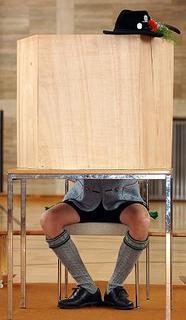Sunday, September 25, 2005
In Conclusion
Another thing this trip taught me was the meaning of true education. I tend to be an overachiever and to stress about school and work and classes - but there was nothing to stress about work-wise with this program; we were given ample time and freedom with our schoolwork, and that gave me the opportunity to really and truly learn. I so often get focused on what the professor is going to test on and memorizing information, and sometimes I miss the big picture for all the details my brain is busy absorbing to regurgitate for the exam. While in Europe, I was able to actually enjoy learning, to let everything sink in and settle itself in my brain, and I know that it was far more effective that way. I honestly could never draw the photosynthesis cycle from memory again, even if my life depended on it, as I (briefly) learned to in biochemistry, and because that was what I was tested over, all my brainpower was devoted to cramming that into my head instead of understanding how the process worked and the significance of it. The things we learned on this trip, by contrast, all fit together to form a broad perspective of medical history, and I was able to step back and view that whole picture because I wasn’t being driven to focus on and memorize select pieces. The result is that I am mentally healthier from this class instead of less so, and I also have retained more useful information. And that information influences me far more than being able to draw the structure of pyruvate ever will.
Partly from the teaching and partly just from living in different culture and studying it, I have definitely gained a broader perspective pertaining to medicine and also to the world in general. I can see how the point of view of someone from another nation and culture could be different from my own and how that would affect their choices and beliefs, including about medical practices. Looking into biomedical research as my field, I have always been acutely aware of the disputes about ethics in particular. I know that, from this experience, I will have a better understanding of why others may view something as inappropriate or offensive that does not seem a big deal to someone like me, and vice versa. My growth in confidence, in recognizing the true purpose of learning, and in understanding people different from myself is already affecting my daily life, and I know that it has equipped me for both the present and the future in ways I cannot yet anticipate.
Saturday, September 24, 2005
Plus ça change, plus la même chose!
And last Sunday, here is how the parties did: CDU/CSU 225 seats; SPD 222; FDP 61; die Linke.PDS 54; die Grüne/Bündnis 90 (a party for which there is no 1947 equivalent) garnered 51 seats. In percent of total Bundestag seats (for comparative purposes I am not including die Grüne’s 51 in the total) that puts the CDU/CSU at 40.0%; SPD at 39.5%; FDP at 10.9% and die Linke.PDS at 9.6%.
Plus ça change, plus la même chose!
Quick update on the Bundestagswahl
Meanwhile, dieLinke.PDS party members elected new leaders and have chosen Gregor Gysi and Oscar Lafontaine to serve as co-party chiefs. In a news conference yesterday, Gysi stated that the only way his party would even consider a coalition with the SPD (or anyone else for that matter) would be if their coalition partner repudiated both the Harz IV and Agenda 2010 reform plans, something Schroeder and the SPD are unlikely to do.
Next Wednesday sees a meeting between Merkel and Schroeder to explore the prospects for a schwarz-rot or "grand" coalition between the CDU/CSU and the SPD. But--both Merkel and Schroeder still insist that they and they alone have the mandate to be Chancellor. That meeting is not going to be pretty!


